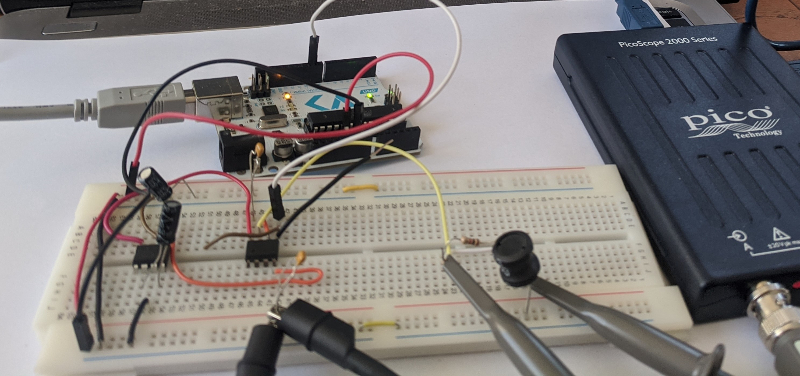- The microcontroller as an embedded system component.
- Input and output devices in a microcontroller.
- Charge, voltage, current, power and energy.
- Electrical and magnetic fields.
- Kirchhoff's laws and Ohm’s law.
- Basic functions of components R,L,C, diode, transistor,operational amplifier and the transformator.
- DC and AC voltage/currents.
- Independent and dependent sources.
- Circuit analysis with mesh and node ananlysis, superposition and Thevenin/Norton equivalents.
- Transients in RC/RL-nets.
- Analyse RLC-nets including resonance circuits using the phasor method.
IE1206 Embedded Electronics 7.5 credits

In this course you will learn about electrical circuits and the function of the basic components in electrical circuits. You will learn to analyze time independent as well as time dependent circuits. After the course you will understand how electrical curcuits work and gain experience in building and measuring them. The course will give you a solid ground for future studies within electronics.
Information per course offering
Choose semester and course offering to see current information and more about the course, such as course syllabus, study period, and application information.
Information for Spring 2026 Start 16 Mar 2026 programme students
- Course location
KTH Campus
- Duration
- 16 Mar 2026 - 1 Jun 2026
- Periods
Spring 2026: P4 (7.5 hp)
- Pace of study
50%
- Application code
60201
- Form of study
Normal Daytime
- Language of instruction
English
- Course memo
- Course memo is not published
- Number of places
Places are not limited
- Target group
- CINTE, TCOMK
- Planned modular schedule
- [object Object]
- Schedule
Contact
Course syllabus as PDF
Please note: all information from the Course syllabus is available on this page in an accessible format.
Course syllabus IE1206 (Spring 2019–)Content and learning outcomes
Course contents
Intended learning outcomes
This course provides basic knowledge of circuit theory and electronics. It also provides knowledge of the various devices that can be found in a microcontroller and how these are supposed to be used.
This means that the student after completing the course will be able to
- design, implement and demonstrate a circuit that is controlled by a microcontroller
- explain the basic electrical and magnetic concepts
- describe passivecomponentsandelectricalnetworks
- perform network calculation and simulations of electrical nets
- analyze basic electrical circuits
- choose components in a circuit design
- conduct measurements on electrical circuits.
Literature and preparations
Specific prerequisites
Recommended prerequisites
- SF1689/SF1690 Basic Course in Mathemathics
- SF1625/SF1685 Calculus in One Variable
- SF1624/SF1684 Algebra and Geometry
- ID1018 Programming I
Literature
Electric Circuits, J.W. Nilsson and S. A. Riedel, 10th edition, Pearson
Examination and completion
Grading scale
Examination
- LABA - Laboratory work, 1.5 credits, grading scale: P, F
- TENA - Examination, 6.0 credits, grading scale: A, B, C, D, E, FX, F
Based on recommendation from KTH’s coordinator for disabilities, the examiner will decide how to adapt an examination for students with documented disability.
The examiner may apply another examination format when re-examining individual students.
If the course is discontinued, students may request to be examined during the following two academic years.
Examiner
Ethical approach
- All members of a group are responsible for the group's work.
- In any assessment, every student shall honestly disclose any help received and sources used.
- In an oral assessment, every student shall be able to present and answer questions about the entire assignment and solution.
Further information
Course room in Canvas
Offered by
Main field of study
Education cycle
Supplementary information
In this course, the EECS code of honor applies, see: http://www.kth.se/en/eecs/utbildning/hederskodex.